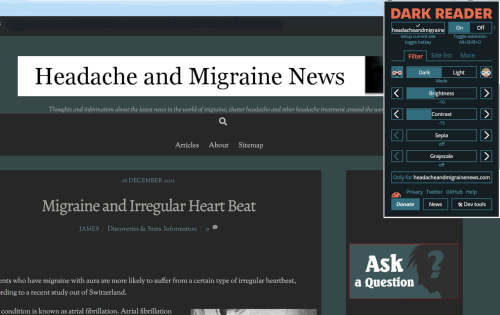Dates and Details Announced! Migraine World Summit 2022
Thanks to your support, the many doctors, researchers, advocates, patients, and organizers are working hard to make the Migraine World Summit even better! The world’s largest online migraine event – organizing online before it was “all the rage” that it is now – is back, and details are starting to be made public.
Well, all right, there’s the first announcement that was made today – the dates of the summit. Wednesday, the 16th of March to Thursday the 24th. And, of course, the summit is free.
Although the full schedule is not up yet (stay tuned!), the basic plan is to have 4 talks per day, 1/2 hour each. Organizers have been working hard to make the interviews concise and spread out, so that our migraine-brains don’t have to have too much screen time. And so that our busy lives can fit in the most important migraine news that we need to know.
Here are some of the topics that will be covered this year:
- The Latest Developments in Migraine Research (Dr. Richard Lipton, Professor of Neurology & Director of the Montefiore Headache Center)
- Staying Hopeful: Treatment Burnout in Chronic Disease (Dr. Dawn Buse, Psychologist & Clinical Professor, Albert Einstein College of Medicine)
- Persistent Chronic Migraine Symptoms Between Attacks (Dr. Christine Lay, Professor of Neurology, Deborah Ivy Christiani Brill Chair, University of Toronto)
- 10 Steps to Migraine Management Your Doctor Should Be Taking (Dr. Messoud Ashina, Professor of Neurology in the Faculty of Health and Medical Sciences, Danish Headache Center, Rigshospitalet Glostrup, University of Copenhagen)
- Autoimmune Disease and Migraine: A Closer Look (Dr. Peter McAllister, Neurologist & Director New England Center for Neurology and Headache)
- Inflammation Control as Migraine Control (Dr. Gretchen Tietjen, Professor Emerita of Neurology University of Toledo)
- Drug-Free Devices for Modulating Migraine (Dr. Deena Kuruvilla, Neurologist & Director Westport Headache Institute)
- The Latest Cannabis Research for Migraine (Dr. Nathaniel M. Schuster, Associate Professor & Associate Clinic Director University of California, San Diego Center for Pain Medicine)
- Osmophobia: Scent-Induced Migraine (Dr. Frederick Godley, Founder & President Association of Migraine Disorders)
With the Olympics in the air these days, you’ll be interested in another special guest this year. Allysa Seely, who won gold medals in both the 2016 and 2020 Summer Paralympics in paratriathlon. For those who don’t know, that’s a punishing event with swimming, cycling, and wheelchair/running. Allysa has had to face a number of physical challenges, migraine being one of them. You won’t want to miss her interview!
Anyway, this was just supposed to be a quick note about the dates. If you have been involved in past years, your old username and password will still work for this year’s summit. So you can just look forward to it!
If you have not registered before, I encourage you to do so now! As I’ve said before, even if you’re not sure how much you can attend, more involvement in the summit does get the attention of researchers and policy makers, and that means more of a push to fight back against migraine, cluster headache, and other headache disorders. It’s free, and just takes a minute – well, if it takes that long, you might be doing something wrong! 🙂
Register here. Let’s start the momentum early!
And for those who are interested, you can also save on the library of interviews and many other resources if you purchase before the summit. Yes, the live summit is free. But many of us like to have the full library to go over at our leisure. And there are a lot of updated extras if you invest in an access pass.
Check that out here, but be sure to scroll down to “Pass Features” (the grey box) to see what’s available. For example, you’ll have access to extended interviews that no one else can access. And you can also gift this pass to someone with migraine, if you want to support them as well!
More news to come!





